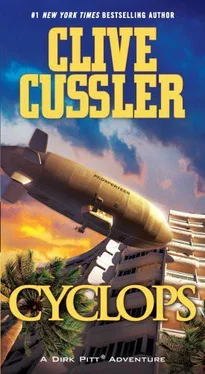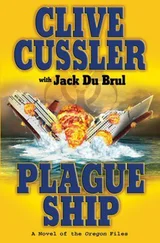In the Spartan living quarters below the flight deck and cockpit the shuttle specialists and Jersey colonists were packed together in every foot of available space. Behind them the sixty-foot-long payload bay was loaded two-thirds full with data records, geological specimens, cases containing the results of more than a thousand medical and chemical experiments-- the bonanza accumulated by the colonists that would take scientists two decades to fully analyze. The bay also carried the body of Dr. Kurt Perry.
The Gettysburg was traveling through space backward and upside down at over 15,000 knots per hour. The small reaction-control jets were fired and joggled the craft over from orbit as thrusters pitched it to a nose-high attitude so the insulated belly could absorb the reentry friction of the atmosphere. Over Australia, two secondary engines burned briefly to slow the shuttle's orbit speed from twenty-five times the speed of sound. Thirty minutes later, they hit the atmosphere shortly before Hawaii.
As the atmosphere grew denser, the heat turned the Gettysburg's belly a vivid orange. The thrusters lost their effectiveness and the elevons and the rudder began to clutch the heavier air. The computers controlled the entire flight. Jurgens and Burkhart had little to do except monitor the TV data and systems indicators.
Suddenly a warning tone sounded in their headsets and a master alarm light came on. Jurgens quickly reacted by punching a computer keyboard to call up details of the problem while Burkhart notified ground control.
"Houston, we have a warning light."
"We read nothing here, Gettysburg. All systems look great."
"Something is going on, Houston," persisted Burkhart.
"Can only be computer error."
"Negative. All three navigation and guidance computers agree."
"I have it," said Jurgens. "We're showing a course error."
The cool voice at the Johnson Space Center returned. "Disregard, Dave. You're right on the beam. Do you copy?"
"I copy, Foley, but bear with me while I go to the backup computer."
"If it will make you happy. But all systems are go."
Jurgens quickly punched a request for navigation data from the backup computer. Less than thirty seconds later he hailed Houston.
"Merv, something's fishy. Even the backup shows us coming down four hundred miles south and fifty east of Canaveral."
"Trust me, Dave," Foley said in a bored tone. "All tracking stations show you on course."
Jurgens looked out his side window and saw only blackness below. He switched off his radio and turned to Burkhart. "I don't give a damn what Houston says. We're off our approach course. There's nothing but water under us when we should be seeing lights over the Baja California peninsula."
"Beats me," said Burkhart, shifting restlessly in his seat. "What's the plan?"
"We'll stand by to take over manual control. If I didn't know better, I'd swear Houston was setting us down in Cuba."
"She's coming in like a kite on a string," said Maisky, his expression wolfish.
Velikov nodded. "Three more minutes and the Gettysburg will be past the point of no return."
"No return?" Maisky repeated.
"To bank and still glide to the runway at the Kennedy Space Center."
Maisky rubbed the palms of his hands together in nervous anticipation. "An American space shuttle in Soviet hands. This has to be the intelligence coup of the century."
"Washington will scream like a village of raped virgins, demanding we return it."
"They'll get their billion-dollar super-machine back. But not before our space engineers have explored and photographed every square inch of her."
"And then there's the wealth of information from their moon colonists," Velikov reminded him.
"An incredible feat, General. The Order of Lenin will be in this for you."
"We're not out of the woods yet, Comrade Maisky. We cannot predict the President's reaction."
Maisky shrugged. "His hands are tied if we offer to negotiate. Our only problem as I see it is the Cubans."
"Not to worry. Colonel General Kolchak has placed a screen of fifteen hundred Soviet troops around the runway at Santa Clara. And, since our advisers are in command of Cuba's aircraft defenses, the shuttle has a clear path to land."
"Then she's as good as in our hands."
Velikov nodded. "I think you can safely say that."
The President sat in a bathrobe behind his desk in the Oval Office, chin lowered, elbows on the arms of his chair. His face was tired and drawn.
He looked up abruptly and said, "Is it certain, Houston can't make contact with the Gettysburg?"
Martin Brogan nodded. "That's the word from Irwin Mitchell at NASA. Their signals are being drowned out by outside interference."
"Is Jess Simmons standing by at the Pentagon?"
"We have him on a direct line," answered Dan Fawcett.
The President hesitated, and when he spoke it was in a whisper. "Then you'd better tell him to order the pilots in those fighters to stand by."
Fawcett nodded gravely and picked up the phone. "Any word from your people, Martin?"
"The latest is they've landed on the beach," Brogan said helplessly. "Beyond that, nothing."
The President felt weighted with despair. "My God, we're trapped in limbo."
One of four phones rang and Fawcett snatched it up. "Yes, yes, he's here. Yes, I'll tell him." He replaced the receiver in its cradle, his expression grim. "That was Irwin Mitchell. The Gettysburg has deviated too far south to reach Cape Canaveral."
"She might still make a water landing," said Brogan without enthusiasm.
"Providing she can be warned in time," added Fawcett.
The President shook his head. "No good. Her landing speed is over two hundred miles an hour. She'd tear herself to pieces."
The others stood silent, searching for the right words. The President swiveled in his chair and faced the window, sick at heart.
After a few moments he turned to the men standing expectantly around his desk. "God help me for signing a death warrant on all those brave men."
<<55>>
Pitt dropped out of the exit shaft and hit the corridor at a dead run. He twisted the handle and threw open the door to the cell that housed Giordino and Gunn with such a force that he nearly tore it from the hinges.
The tiny room was empty.
The noise betrayed him. A guard rushed around the corner from a side passage and stared at Pitt in astonishment. That split-second hesitation cost him. Even as he was lifting the barrel of his weapon, the baseball bat caught him on the side of the head. Pitt had grabbed the unfortunate guard around the waist and was dragging him into a convenient cell before he hit the floor. Pitt threw him on a bed and looked down into the face of the young Russian who had escorted him to Velikov's study. The boy was breathing normally, and Pitt figured the damage was no more than a concussion.
"You're lucky, kid. I never shoot anyone under the age of twenty-one."
Quintana was just coming out of the exit shaft as Pitt locked the guard in the cell and took off running again. He did not bother to be careful of concealing his presence. He would have welcomed the chance to bash the head of another guard. He reached the door to Jessie's cell and kicked it open.
She was missing too.
Dread swept through him like a wave. He plunged on through the corridors until he came to room six. There was nothing inside but the stench of torture.
Dread was replaced by cold, ungovernable rage. Pitt became someone else, a man without conscience or moral code, no longer in control of his emotions, a man for whom danger was merely a force to be ignored. Fear of dying had totally ceased to exist.
Quintana hurried up to Pitt and clutched his arm. "Damn you, get back to the beach! You know the orders=
Читать дальше












